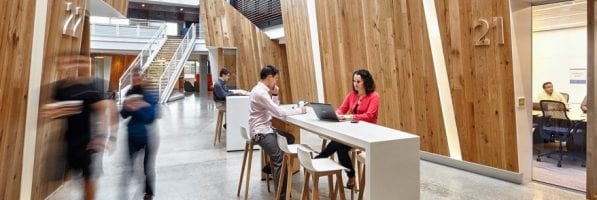New MBA Jobs at Four Tech Companies Making Big Announcements

Some of the world’s largest tech companies made waves recently with exciting, and in some cases game-changing, announcements at and around the 2019 Game Developers Conference. These new ideas, products, and services were developed by teams comprised of developers, marketers, and MBAs brought on to bring innovation to the table. Continue reading…
Five Surprisingly Lucrative MBA Destinations

Even though the most common MBA careers are those in the areas of consulting, banking and finance, there are other options out there. In fact, you’d be surprised to learn which companies truly value hiring MBAs into high paying management positions, and the sectors those firms occupy. Whether its tech, media, or retail, here’s a breakout of five surprisingly lucrative MBA destinations. Continue reading…
New MBA Jobs at Five Tech Giants

As the line between business and information technology industries continues to blur, more and more professionals are looking to business schools and MBA programs to get them into the tech industry. Here’s a rundown of some New MBA jobs at five different tech giants: Continue reading…
Wharton Reveals 2018 MBA Employment Report, Announces $25 Mil Gift

Lots of news out of the Wharton School at the University of Pennsylvania recently. Employment statistics have been published for the most recent graduating class, and a big donation will fund a cool new building dedicated to entrepreneurship in West Philadelphia as well as more international scholarships for undergraduates.
Here’s what’s going on at the Wharton School.
Penn Employment Report (2018)
The 2018 MBA Career Report revealed a slight increase in job offers and salaries with finance drawing in more students than ever. In 2018, 36.9 percent of full-time MBA graduates went into financial services (up from 33 percent last year). Consulting lured the second most graduates at 25 percent, down from 28 percent in 2017. As for technology—the third most sought-after industry—this year there was a small dip down to 14.9 percent from 16 percent in 2017.
Employment Summary
Overall, of the 77.9 percent of Wharton MBAs seeking employment, 98.4 percent received a job offer 90 days post-graduation, and 94.6 percent accepted. For the remaining 17.2 percent not seeking employment—140 students—84 returned to their current company (60 percent), 34 started their own company (24 percent), 17 postponed their job search (12 percent), and five students gave another reason (3 percent).
As for top employers, many prominent companies hired two or more graduates including Accenture Strategy, Facebook, Amazon, Apple, Bain & Company, Deloitte Consulting, McKinsey & Company, Microsoft, and Tesla.
Salaries Rise
Wharton MBA salaries continued their climb, with the school reporting a $5,000 increase in total median base salary, bringing that figure to $135,000 in 2018. The highest median salary—$180,000—went to graduates heading into professional services, followed by venture capital at $175,000 and hedge fund managers at $162,000.
As for regional differences in salaries, the 42.7 percent of Wharton MBA graduates who accepted positions in the Northeastern United States commanded a median salary of $140,000. Another 23.2 percent of grads headed to the West, where the median annual salary was $135,000. The Mid-Atlantic region of the U.S., with its median annual salary of $139,000, drew the third largest percentage of grads, at 7.7 percent. Interestingly, those who took jobs in the Midwest and South reported the biggest paydays, with a median salary of $150,000. This was trailed by the Southwest, with a median annual salary of $145,000.
Another 11.7 percent of the graduating class sought post-graduation employment outside the United States, where salaries on the whole were lower. In Latin America, the median annual salary is $92,000. Salaries are slightly better in Europe, where the median is $119,000, and best in Asia, at $126,000.

$25 Million Gift for Scholarships and New Hall
Right on the heels of publishing its employment statistics last week, the Wharton School also announced a $25 million gift. The transformative gift will go toward constructing Tangen Hall, the first-ever dedicated space for cross-campus entrepreneurship at the University of Pennsylvania. It will also establish an international scholarship fund.
“This gift not only represents a profound commitment to Penn and Wharton student financial aid; it also energizes our entire campus community through Tangen Hall, a game-changing facility for innovation, entrepreneurship, and technology,” Wharton Dean Geoffrey Garrett said in a press release.
Alumnus Donation
Nicolai Tangen, the founder of London-based investment partnership AKO Capital and 1992 Wharton undergraduate alumnus, encouraged the AKO foundation to donate as part of Wharton’s More Than Ever fundraising campaign.
“Katja and I are continually inspired by Penn students and pleased to have the opportunity to engage with them and set them up for success,” Tangen says. “We look forward to their many achievements in the years ahead and to witnessing how this new building will bring together the next generation of entrepreneurs, leaders, and innovators to share their talents with one another and for the greater good.”
Tangen Hall
Tangen Hall will be located at 40th and Sansom Street, offering students almost 70,000 square-feet of space to pursue entrepreneurial goals. The hall brings together students from across the university to participate in the new Venture Lab. Also, the building will become the new home of many entrepreneurship-focused programs including:
- Penn Wharton Entrepreneurship
- Goergen Entrepreneurial Management Program
- Weiss Tech House
- Sol C. Snider Entrepreneurial Research Center
- Wharton Small Business Development Center
- The Master’s Level Integrated Product Design Program
Tangen Hall will have dozens of meeting and collaboration spaces for students, retail space for student ventures, a test kitchen, a maker lab with 3D printers and laser cutters, a VR cave, and a café.
“Tangen Hall marks a new chapter for the entrepreneurial community at Penn and in Philadelphia, providing a central hub for the groundbreaking innovations that happen here every day,” Wharton Vice Dean of Entrepreneurship and Innovation Karl Ulrich says. “This physical space will allow faculty to more strongly support students who turn ideas into outcomes that will transform business for years to come.”
Construction will begin in 2019 with completion slated for 2020.
International Scholarship Fund
Beyond Tangen Hall, the $25 million will also go toward a new Katja and Nicolai Tangen International Endowed Scholarship, which will provide funding for international undergraduate students. The goal is to help students who could otherwise not afford a Penn education.
It’s the fourth scholarship made possible thanks to the AKO Foundation and the Tangens. So far, they’ve supported a total of 22 Penn students since 2012.
“We are profoundly grateful to Nicolai and Katja Tangen for their extraordinary commitment to extend opportunities for entrepreneurship to all Penn students,” Penn President Amy Gutmann says. “We are also grateful that Nicolai and Katja are expanding their steadfast scholarship support, enabling the best students from every part of the world to attend Penn, to thrive in their studies, and to serve communities worldwide.”
This article has been edited and republished with permissions from Clear Admit.
DMSB Keynote Speaker Encourages MBAs, New Startups, and More – Boston News

Let’s explore some of the most interesting stories that have emerged from Boston business schools this week.
Life is Like a Venture Investment, Biotech Entrepreneur Tells Business Graduates – D’Amore-McKim Blog
The Northeastern University D’Amore-McKim School of Business selected biotech entrepreneur Dr. Gerald Chan as the keynote speaker at the DMSB graduation ceremony last month.
Dr. Chan, whose private investment firm Morningside Group funds “life sciences startups that are working to discover new ways to treat disease,” implored the assembled crowd at Matthews Arena to “live a life that makes themselves and their loved ones proud” even if “life can be at times so scary and at other times so exhilarating.”
Dr. Chan shared a personal anecdote about his father’s refusal to accept a job at casino on ethical grounds: “Had he accepted that offer, our family would have become financially richer. But because he acted on his ethical principles against his own economic interest, my family can stand tall today.”

D’Amore-McKim School of Business graduates, during last month’s ceremony / Photo via damore-mckim.northeastern.edu
You can read the full article here for a complete overview of the ceremony.
Winning Paper Shows Network Effects Fuel Business Value and Upend Strategy – Questrom School of Business Blog
BU Questrom School of Business‘ Marshall Van Alstyne recently co-authored new research that finds that “platform businesses” that depend on high numbers of users like Microsoft, Apple, Uber, Google, and Amazon scale much faster by moving value creation from “internal production to external orchestration.”
In “Platform Ecosystems: How Developers Invert the Firm,” Van Alstyne and his co-authors conclude that this approach will reverberate through “every part of a business, from marketing to operations to human resources.”
“Instead of a firm doing all its own marketing, consumers can add value through viral marketing. Instead of AirBnB incurring operating costs of a hotel stay, ecosystem partners bear those costs.”
“Instead of hiring employees inside the firm, platforms rely on freelancers outside the firm. In each of these instances, the value-creating activity shifts from inside to outside the firm. This shift affects all of the traditional business functions. It also has profound implications for fair division of wealth in society.”
You can read the full article here and the complete paper here.
25 MIT Startups To Watch – MIT Sloan Newsroom
On Saturday, September 8, Bill Aulet, Managing Director of the Martin Trust Center for MIT Entrepreneurship told the crowd at the MIT Kresge Auditorium, “We’re not just going to be doing another dating app.”
“We’re going to be doing things like addressing inclusion in society, making a more informed citizen throughout the world, cybersecurity, mental health, urbanization, improving ed-tech, improving health care. These are significant problems that the brightest people in the world should be working on, and those people are MIT students.”
The ambitions Aulet spoke about were created from the 25 startups built within the MIT delta v accelerator, which you can check out here.
Coding Becoming a Priority for Columbia Business School MBAs

Like every other elite business school worth its salt, Columbia Business School (CBS) has seen a huge surge in student interest in programming and analytics courses.
It started three years ago when Costis Maglaras, the chair of the Decision, Risk & Operations division of CBS, oversaw development of a new analytics curriculum with the goal to ensure that students were being trained in quantitative, data-driven decision-making.
Maglaras couldn’t help but notice a major gap: There were few courses in computer programming, artificial intelligence, and machine learning.
He took it upon himself to help develop a series of MBA-level programming that included analytics-focused classes to give MBA students the digital tools they needed to become tech-savvy managers. In tandem with Maglaras’ efforts, the student-run Technology Business Group helped develop courses around the programming languages of SQL and Python.
Now more than a dozen elective programming courses have been launched across CBS, helping MBA graduates land management positions at Amazon, Facebook, and Microsoft. And the popularity of these courses is only growing.
“Taking those classes gave me a lot of confidence for my interviews,” says Neha Bansal, MBA ’18. She credits the new curriculum for helping her land a job at Google as a product manager due in small part to her Python expertise.
Bansal is far from the only student who’s reaped the benefits. There are now more than 300 MBA students at CBS who have signed up to learn Python—a highly marketable skill. The only problem: The classes have now become almost too popular.

More than a dozen coding language programs have recently launched for business school students at CBS, thanks in part to the student-run Technology Business Group.
The division hired additional faculty and to figure out how to integrate the new analytics programming more intricately into the overall curriculum. Across the board, CBS is seeing more MBA students interested in programming because, simply put, it’s what employers want.
For example, Citigroup recently announced it would train all incoming analysts in Python. Goldman Sachs has asked its traders to learn how to code. According to a recent Financial Times survey, “understanding digital impact on business” is one of the most important skills for an MBA and one of the most difficult skills to recruit.
“The reality is we’re living in a very data-centric world, and whether we like it or not it’s going to be an important factor in any decision-making process down the road,” Hardeep Johar, of the CBS Engineering School, says. “We need people to be savvy about how to use data analytics and artificial intelligence on all the important decisions of today.”
To read the full article and all about what Columbia Business School is doing to help prepare MBA students to embrace data analytics, visit the CBS website.

